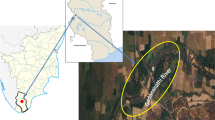Summary
Distressed menhaden collected from the Ashley River, South Carolina, were found to have 46.8% less acetylcholinesterase (AChE) activity in brain homogenates as compared to menhaden collected from offshore waters. Menhaden and croakers also taken from the Ashley River, but not in a distressed condition, were found to be 16.5 and 35.8% inhibited, respectively. AChE inhibiting materials were found in three of twelve waste water samples collected from the vicinity of the Ashley River.
Similar content being viewed by others
References and notes
Weiss, Charles M.Ecology, 39 (2), 1958.
Weiss, Charles M.Sewage and Industrial Wastes, 31 (5), 1959.
Weiss, Charles M.Trans. Am. Fish. Soc., 90 (2), 1961.
Hestrin, S.J. Bio. Chem., 180, 1949.
Snedecor, G. W.Statistical Methods. 5th ed., Iowa State College Press, Ames, Iowa, xii, 534 pp.
Teasley, J. I. (Personal Communication).
Author information
Authors and Affiliations
Rights and permissions
About this article
Cite this article
Williams, A.K., Sova, C.R. Acetylcholinesterase levels in brains of fishes from polluted waters. Bull Environ Contam Toxicol 1, 198–204 (1966). https://doi.org/10.1007/BF01684097
Issue Date:
DOI: https://doi.org/10.1007/BF01684097




